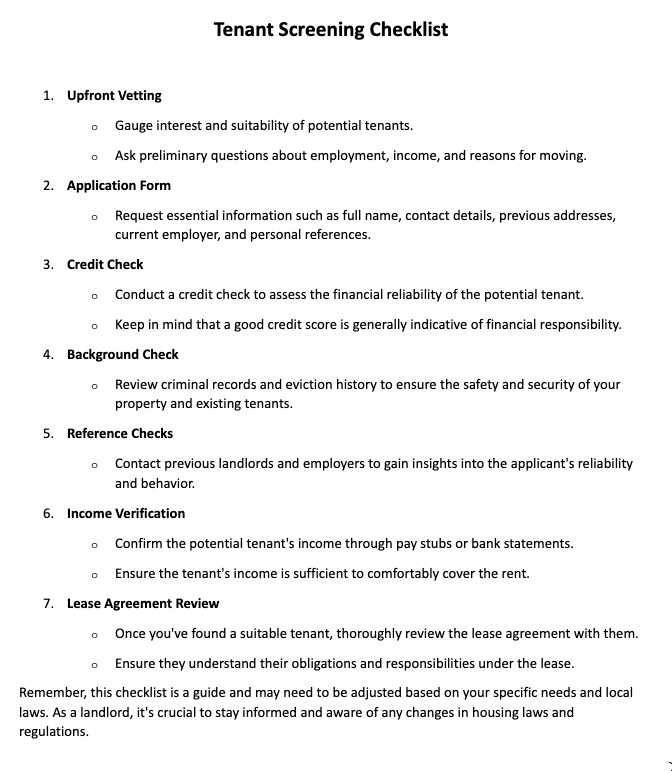From Tenant Screening to Lease Agreements: Mastering the Basics of Property Management
From Tenant Screening to Lease Agreements: Mastering the Basics of Property Management involves a comprehensive understanding of the various processes and regulations involved in managing rental properties. Tenant screening, for example, is a crucial aspect of property management as it helps landlords evaluate potential tenants based on their rental history, credit score, and income verification. By thoroughly screening tenants, property managers can minimize the risk of renting to individuals who may have a history of late payments or property damage.
Furthermore, lease agreements play a vital role in establishing the rights and responsibilities of both landlords and tenants. A well-drafted lease agreement can help prevent disputes and ensure that both parties understand the terms of the rental agreement. For property managers, having a solid understanding of lease agreements is essential for effectively managing rental properties and maintaining a positive landlord-tenant relationship. In the upcoming sections of this article, we will delve into the key takeaways of mastering the basics of property management, including the importance of clear communication, maintaining property maintenance standards, and handling tenant issues professionally. Stay tuned for valuable insights on how to excel in the field of property management.
What you should know
1. Conducting thorough tenant screenings is crucial to ensuring reliable and responsible tenants for your property.
2. Clear and comprehensive lease agreements are essential to protecting both landlords and tenants from potential disputes.
3. Maintaining regular communication with tenants can help foster good relationships and address any issues in a timely manner.
4. Understanding local laws and regulations surrounding property management is vital to staying compliant and avoiding legal issues.
5. Implementing a system for property maintenance and regular inspections can help prevent costly repairs and ensure that the property is well-maintained.
What is Tenant Screening and Why is it Important in Property Management?
Tenant screening is a crucial process in property management that involves evaluating potential tenants to ensure they are reliable, responsible, and able to pay rent on time. This process typically includes conducting background checks, verifying income and employment, checking rental history, and reviewing credit reports. By thoroughly screening tenants, property managers can reduce the risk of renting to individuals who may cause damage to the property, fail to pay rent, or violate lease agreements.
Tenant screening is important because it helps property managers select tenants who are likely to fulfill their lease obligations, maintain the property in good condition, and be respectful of neighbors. By carefully vetting potential tenants, property managers can minimize the likelihood of costly evictions, property damage, and legal disputes. Additionally, tenant screening can help protect the reputation of the property and attract high-quality tenants in the future.
In order to effectively screen tenants, property managers should establish clear screening criteria, communicate these criteria to potential tenants, and consistently apply them to all applicants. It is also important to comply with fair housing laws and regulations to ensure that all applicants are treated fairly and without discrimination. By investing time and resources into thorough tenant screening, property managers can mitigate risks and create a positive rental experience for both tenants and landlords.
Understanding Lease Agreements in Property Management
A lease agreement is a legally binding contract between a landlord and a tenant that outlines the terms and conditions of renting a property. This document typically includes details such as the duration of the lease, the amount of rent, the responsibilities of both parties, and any rules or regulations that must be followed during the tenancy.
Lease agreements are important in property management because they help protect the rights and interests of both landlords and tenants. By clearly defining the expectations and obligations of each party, lease agreements can prevent misunderstandings, disputes, and legal issues. Additionally, lease agreements provide a framework for resolving conflicts, enforcing rules, and addressing issues such as maintenance, repairs, and rent payments.
When creating a lease agreement, property managers should ensure that it complies with local landlord-tenant laws and regulations. It is important to include all relevant terms and conditions, such as the security deposit amount, pet policies, and procedures for ending the lease early. Property managers should also clearly communicate the terms of the lease to tenants and provide them with an opportunity to ask questions or seek clarification. By drafting comprehensive and enforceable lease agreements, property managers can establish a positive and professional relationship with tenants while protecting their investment in the property.
Tips for Mastering Property Management
1. Establish clear communication channels with tenants to address any concerns or issues promptly.
2. Conduct regular property inspections to identify maintenance needs and ensure compliance with lease agreements.
3. Keep detailed records of all interactions with tenants, including maintenance requests, rent payments, and lease violations.
4. Stay informed about local rental market trends, laws, and regulations to make informed decisions and stay competitive.
5. Consider investing in property management software to streamline administrative tasks, track finances, and communicate with tenants efficiently.
By following these tips and best practices, property managers can effectively manage their properties, attract and retain high-quality tenants, and maximize their return on investment. Property management requires attention to detail, strong communication skills, and a commitment to upholding legal and ethical standards. By mastering the basics of property management, landlords can create a positive rental experience for tenants while protecting their property and financial interests.
1. What is the importance of tenant screening in property management?
Tenant screening is a crucial step in property management as it helps landlords and property managers ensure they are selecting reliable and responsible tenants. By conducting thorough background checks, credit checks, and rental history verification, property managers can reduce the risk of renting to tenants who may cause damage to the property, fail to pay rent on time, or violate lease agreements. Tenant screening also helps protect the safety and well-being of other tenants in the building or community.
2. How can property managers effectively screen potential tenants?
Property managers can effectively screen potential tenants by requesting rental applications that include detailed information about the applicant’s employment history, income, rental history, and references. They can also conduct background checks to verify the applicant’s criminal history and credit checks to assess their financial responsibility. Additionally, property managers can contact previous landlords to inquire about the applicant’s rental behavior and reliability. By utilizing a comprehensive screening process, property managers can make informed decisions about which tenants are the best fit for their properties.
3. What are the key components of a lease agreement in property management?
A lease agreement in property management is a legally binding contract between the landlord and tenant that outlines the terms and conditions of the rental agreement. Key components of a lease agreement include the duration of the lease, the amount of rent and security deposit, the responsibilities of the landlord and tenant, rules for maintenance and repairs, and policies for late payments and lease violations. It is important for property managers to draft clear and detailed lease agreements to protect both parties and avoid any misunderstandings or disputes during the tenancy.
4. How can property managers handle lease violations and evictions?
When a tenant violates the terms of the lease agreement, property managers must follow the proper legal procedures to address the issue. This may involve issuing a warning or notice to the tenant, conducting a meeting to discuss the violation, or taking legal action to evict the tenant if necessary. Property managers should familiarize themselves with local landlord-tenant laws and regulations to ensure they are following the correct procedures for handling lease violations and evictions. It is important for property managers to communicate effectively with tenants and document all interactions and actions taken in response to lease violations.
5. How can property managers ensure a smooth move-in and move-out process for tenants?
Property managers can ensure a smooth move-in and move-out process for tenants by providing clear instructions and guidelines for both processes. This may include conducting a thorough move-in inspection with the tenant to document the condition of the property, collecting a security deposit to cover any damages, and outlining the procedures for returning the security deposit at the end of the tenancy. Property managers should also provide tenants with a move-out checklist to help them prepare the property for inspection and return the keys on time. By establishing clear expectations and communication channels, property managers can help facilitate a positive experience for both tenants and landlords during the move-in and move-out process.










